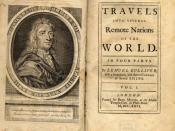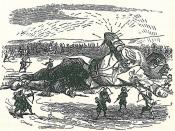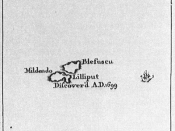Jonathan Swift's story, Gulliver's Travels is very complex, with several layers of meaning. He is a master satirist, and Gulliver's Travels is both humorous and critical. He critiques almost every aspect of life, from the writings of his times to the politics. He also satirizes more encompassing topics that are still relevant today, such as the human condition, and the desire for overcoming inferior instincts.
The first satire we see in the story comes from chapter one, where it begins as a typical travel record of the time. We are provided with a description of Gulliver's education to establish his position in society, which would have resembled a real travel log at the time. This style is continued throughout the novel, which strengthens the satire. The factual way in which the story is told makes it seem much more realistic than if it was written in a fanciful way.
The satire of the story would be ruined if it did not seem truthful or accurate because it would be irrelevant, but the factual style reinforces the satirical elements.
Gulliver's Travels was written at a time of exploration and expansion. England had a formidable fleet of ships, and people visited many new places, discovering new plants, new animals, new places, and most importantly, new people. Colonization had begun in 1607, and when Swift was writing, it would have just been gaining in popularity, and there would have been a keen interest in the new people found there. The new and radically different people that Gulliver encounters, such as the Lilliputians, are a direct reflection of the cultural differences of the new people being encountered.
The entire basis for the satire is the difference in the way that Gulliver sees the world compared to the way the reader sees it. Gulliver...


